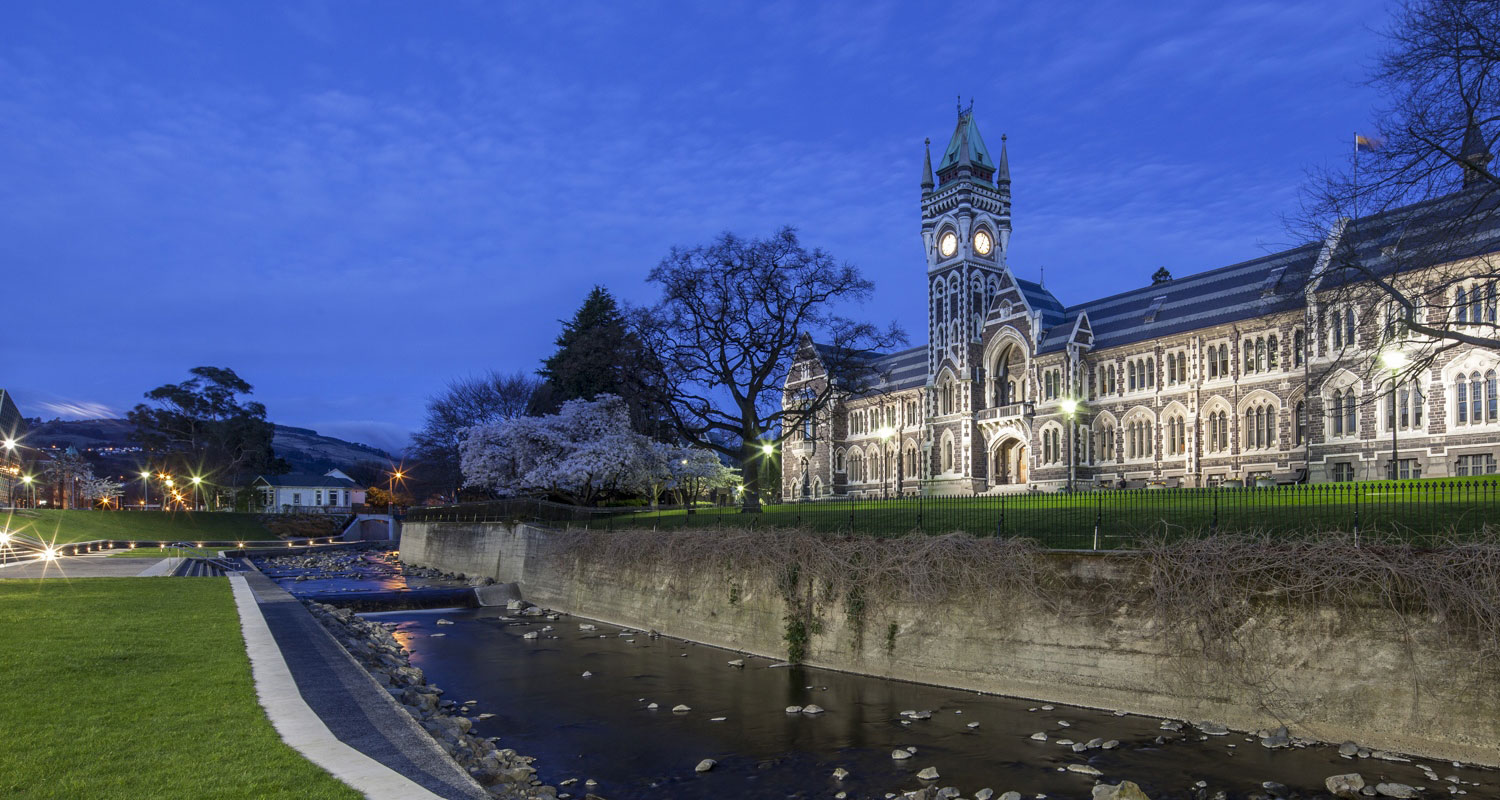
UniNews
Teaching excellence
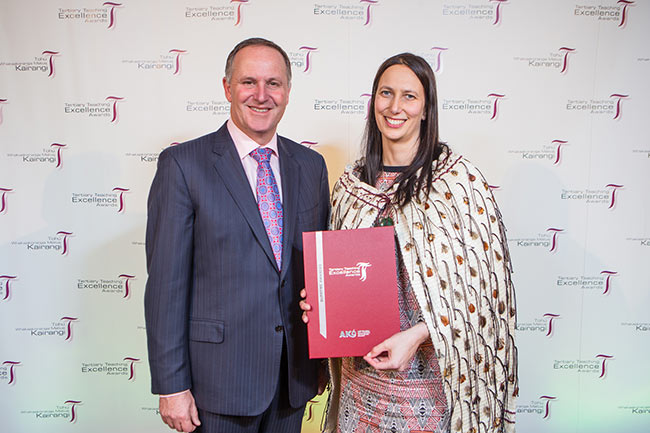
Faculty of Law's Professor Jacinta Ruru (above) has received New Zealand's highest accolade for tertiary teaching, the Prime Minister's Supreme Award for Teaching Excellence. This is the fifth consecutive year that this award has been won by a University of Otago staff member and was presented by the Prime Minister the Rt Hon. John Key.
The national Tertiary Teaching Excellence Awards are held annually at Parliament to celebrate New Zealand's finest tertiary teachers as recognised by their organisations, colleagues, learners and broader communities.
As the first Professor of Law of Māori descent in New Zealand and the only Māori Law Faculty staff member at the University of Otago since 1999, Professor Ruru is designing a new experience for students learning law. Her strategy is to give greater focus to Māori experiences of the law, Māori relationships with land and Māori challenges for change in the classroom.
Other Otago staff recognised in the awards were: Dr Judith Bateup (Microbiology and Immunology); Professor Darryl Tong (Oral Diagnostics and Surgical Sciences): and Dr Rachel Zajac (Psychology).
University makes significant economic impact
The University of Otago continues to make a major contribution to Dunedin and the national economy. The recently-released Economic Impact Report for 2015 shows that the University is one of the 50 largest employers in the country and one of the largest in the South Island. The Dunedin campus, which has around 93 per cent of students and 88 per cent of all staff, injected an estimated $881.1 million directly into the city's economy through spending by the University, its staff and students.
The University's campuses in Christchurch and Wellington each contributed $51.9 million and $50.5 million to their respective economies. Invercargill contributed $2.4 million, while the Auckland Centre and Wellington City Office combined injected $800,000 into their respective economies.
Taking into account the estimated trickle-down effects of this, the total impact of hosting a campus in Dunedin added $1.55 billion to the city's economy (supporting directly and indirectly 13,902 jobs), $109.7 million to Christchurch (supporting 779 jobs), and $96.4 million to Wellington (supporting 765 jobs).
Health research supported
University of Otago researchers have been awarded around $43.8 million in new health research funding to support their world-class studies aimed at improving New Zealanders' health and well-being.
In the latest Health Research Council of New Zealand annual funding round, Otago researchers gained 22 contracts, including five major multi-million-dollar five-year programmes and 17 projects, each of which attracts more than one million dollars in funding. Otago's recipients are from across the University's campuses in Dunedin, Christchurch and Wellington with each campus hosting at least one of the major new programmes to receive funding.
China-New Zealand health research centre funded
The health-related National Science Challenges (NSCs) will collaborate in a new centre to enhance links between New Zealand and China relating to research into non-communicable diseases.
Three NSCs will participate – Healthier Lives, Ageing Well and A Better Start. This collaboration currently encompasses 219 researchers in 26 institutions. Healthier Lives Director Professor Jim Mann (University of Otago) will head the new centre, which is named the New Zealand-China Non-Communicable Diseases Collaboration Centre. It is expected that as the centre is established it will be joined by other New Zealand groups who are working in this area to enhance collaborations with colleagues in China.
Otago joins life science venture fund
The University has signed up to become a member of the Medical Research Commercialisation Fund (MRCF), Australia's largest life science venture fund.
The fund provides dedicated investment funding and expertise to support the development of very early stage research innovations. Early-stage opportunities can receive up to AUD$3 million to support preclinical development. Ideas that successfully make it through that stage can receive a further AUD$17 million in investment support.
Dr Gavin Clark, Director of the University's Research and Enterprise Office, says joining the MRCF opens exciting opportunities to develop important biomedical discoveries at the University into technologies that can improve people's health and wellbeing.
Lab-in-a-Box visit
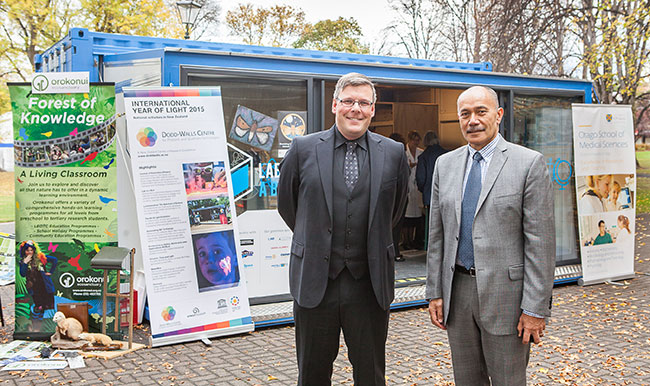
Associate Professor Peter Dearden and the Governor-General, His Excellency, Lt Gen. the Rt Hon. Sir Jerry Mateparae, outside the Lab-in-a-Box.
Trying on 3D goggles to see the solar system close-up, viewing a projected image of bee wings, and speaking with local high school pupils about their research pursuits were all part of Governor-General Sir Jerry Mateparae's May visit to the Lab-in-a-Box: a science laboratory which folds away into a standard shipping container, so it can be transported around the country.
Otago's Professor Peter Dearden was Sir Jerry's guide during his tour of the lab, which takes science to the country to encourage and inspire rural schools and communities to engage with science and technology. It is a partnership between the University, Otago Polytechnic, the Otago Museum, and Orokonui Ecosanctuary, and is also supported by a large range of local institutions.
Awards/Achievements
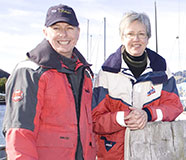 Professors Steve Dawson (Marine Science) and Liz Slooten (Zoology) have been jointly awarded the New Zealand Marine Science Society's inaugural John Morton Medal in recognition of their outstanding contributions to the advancement of marine conservation and sustainability in New Zealand.
Professors Steve Dawson (Marine Science) and Liz Slooten (Zoology) have been jointly awarded the New Zealand Marine Science Society's inaugural John Morton Medal in recognition of their outstanding contributions to the advancement of marine conservation and sustainability in New Zealand.
Professor Lisa Matisoo-Smith (Anatomy), an internationally renowned biological anthropologist who pioneered the use of evolutionary genetics to trace Pacific migrations, is the latest recipient of the Distinguished Research Medal, the University of Otago's highest distinction.
Established health researchers Professors Richie Poulton (Psychology) and Warren Tate (Biochemistry), and emerging researchers Associate Professor Suetonia Palmer (Medicine, Christchurch) and Dr Emma Wyeth (Preventive and Social Medicine) have received Health Research Council awards for an outstanding contribution to health research excellence, leadership and impact.
Professor Tim Wilkinson (Medicine, Christchurch) is the latest recipient of the Australian and New Zealand Association for Health Professional Educators award. Based in Christchurch, Professor Wilkinson is programme director for medical student training in the Bachelor of Medicine and Bachelor of Surgery across the University's three schools – in Dunedin, Christchurch, and Wellington.
Christchurch gastroenterologist Professor Richard Gearry is this year's winner of the Carl Smith Medal and Rowheath Trust Award, which recognises outstanding research performance from University of Otago staff early in their research career. In less than a decade as an independent researcher, Professor Gearry has become one of the world's foremost experts on gastroenterological research and clinical management.
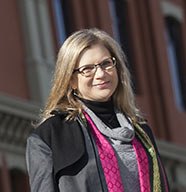 Professor Elizabeth Rose (Management) has become a Fellow of the Academy of International Business in recognition of her contributions to scholarly development in the field of international business.
Professor Elizabeth Rose (Management) has become a Fellow of the Academy of International Business in recognition of her contributions to scholarly development in the field of international business.
Professor Hamish Spencer (Zoology), has been appointed by the Ministry of Business, Innovation and Employment as one of two Departmental Science Advisors.
Associate Professor Nicola Taylor (Children's Issues Centre) has been named joint winner of the 2016 Tim Salius President's Award by the Association of Family and Conciliation Courts in recognition of her international work in promoting an empirically-based approach in the field of child abduction and relocation.
Associate Professor Donna Buckingham (Law) has been named as a New Zealand Law Commissioner.
Health Research Council Emerging Researcher First Grants have been won by two up-and-coming University of Otago, Christchurch researchers. Dr Claire Heppenstall (Medicine) receives $145,459 for a project focused on taking rest-home residents off unnecessary medicines, while Dr Pippa Scott (Pathology) gains $149,982 to investigate transmission of infectious bacteria between cattle and people in rural communities. The HRC also announced seven Feasibility Study recipients, four of whom are Otago researchers: Associate Professor Bob Hancox (Preventive and Social Medicine), Professor Janet Hoek (Marketing), Professor Pauline Norris (Pharmacy) and Dr Lisa Te Morenga (Human Nutrition).
Six up-and-coming University of Otago staff have been announced as this year's recipients of Early Career Awards for Distinction in Research. Dr Louise Bicknell (Pathology, Dunedin School of Medicine), Dr Peter Mace (Biochemistry), Dr Rob Middag (Chemistry), Dr Giles Newton-Howes (Psychological Medicine, Wellington), Dr Damian Scarf (Psychology) and Dr Benjamin Schonthal (Theology and Religion) have been selected for the award on the basis of their outstanding research achievements.
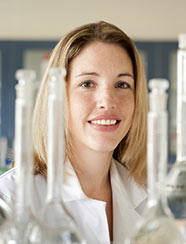 University of Otago and the MacDiarmid Institute's Dr Carla Meledandri (Chemistry) has been named a joint winner of the annual Emerging Innovator Award at the KiwiNet Research Commercialisation Awards, for her work harnessing silver nanoparticles to treat and prevent dental disease.
University of Otago and the MacDiarmid Institute's Dr Carla Meledandri (Chemistry) has been named a joint winner of the annual Emerging Innovator Award at the KiwiNet Research Commercialisation Awards, for her work harnessing silver nanoparticles to treat and prevent dental disease.
The College of Education's Dr David Berg has received the 2016 national Emerging Teacher Educator Award, from the Teacher Education Forum of Aotearoa New Zealand.
A number of current and former Otago students have received 2016 Fulbright awards. Maia Wikaira received a Fulbright-Ngā Pae o te Māramatanga Graduate Award. Henry Lane and Chantal Juntao Chen received Fulbright Science and Innovation Graduate Awards. Clara Pau and Emily Draper received Fulbright New Zealand General Graduate Awards. Also, Daniel Coppersmith and David Grainger received a Fulbright US Graduate and Fulbright US Scholar Awards respectively to study at Otago.
The four-part series Predict my Future – The Science of Us, a television documentary on the University of Otago's internationally lauded Dunedin Study, has won a silver world medal in the prestigious 2016 New York Festivals International Television and Film Awards.
Appointments
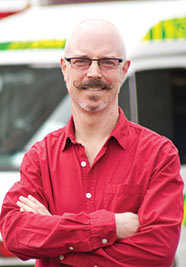 Professor Robin Gauld as the next Dean of the University's Otago Business School. A highly respected academic, Professor Gauld is a social scientist whose degrees are in public policy, administration and management. He is currently head of the Department of Preventive and Social Medicine. He is also Founding Director of the University's Centre for Health Systems, which spans the Business School and the Dunedin School of Medicine.
Professor Robin Gauld as the next Dean of the University's Otago Business School. A highly respected academic, Professor Gauld is a social scientist whose degrees are in public policy, administration and management. He is currently head of the Department of Preventive and Social Medicine. He is also Founding Director of the University's Centre for Health Systems, which spans the Business School and the Dunedin School of Medicine.
Professor David Murdoch as the next Dean of the University of Otago's Christchurch campus. The infectious diseases expert is currently head of the campus' Department of Pathology and has been involved in significant infectious disease research projects including a global childhood pneumonia study funded by the Bill & Melinda Gates Foundation, and a New Zealand-wide Legionnaire's disease surveillance programme.
Dr Carlo Marra as the latest Dean of the School of Pharmacy. Dr Marra was previously Dean and Professor at the School of Pharmacy at Memorial University of Newfoundland. His research has mainly focused on health economics, quality-of-life research and pharmacoepidemiology, including evaluations in musculoskeletal and respiratory diseases.
Mr Dave Scott as the latest Proctor. He was previously the Dunedin Area Response Manager with Dunedin Police, a role with responsibility for the day-to-day running of all frontline policing activities. Before that he was a Southern Police District Centre Co-ordinator. He took up his new role in May.
Queen's Birthday Honours
Alumni and academic staff recognised in the Queen's Birthday Honours include:
Companion of the New Zealand Order of Merit (CNZM): Professor John Broughton, for services to Māori health, theatre and the community.
Member of the Order of Merit (MNZM): Professor Elisabeth (Judy) Bellingham, for services to classical singing; Mr Michael David Ferrari, for services to business and the community; Dr Garry Harold Nixon, for services to rural health.
Queen's Service Medal (QSM): Mrs Lynley Barbara Dear, for services as an author and to historical research.
Emeritus Professors
The University Council has recently awarded the following academics the status of Emeritus Professor: Professor John J. Evans (Obstetrics and Gynaecology), Professor David F. Gerrard (Dunedin School of Medicine), Professor Brendan J. Gray (Marketing), Professor J. Frank T. Griffin (Microbiology and Immunology), Professor Peter R. Joyce (Psychological Medicine, Christchurch), Professor Robert W. Lawson (Marketing) and Professor David Wharton (Zoology).
Obituaries
Emeritus Professor of Education and Childhood Studies, and Fellow of the Royal Society of New Zealand, Anne B. Smith, CNZM. In 1995, she became the founding Director of the Children's Issues Centre. Throughout her career, she was a driving force behind early childhood education in New Zealand and beyond, and a passionate advocate for children's rights.
Emeritus Professor Richard J. Norris. Emeritus Professor Norris joined Otago in 1970, becoming a professor in 1999. During his time at the University, his research interests included structural geology and tectonics; neotectonics, paleoseismology, and Alpine Fault structure; New Zealand Cenozoic tectonics and basin evolution; as well as deformation in the Haast schists.
Emeritus Professor John A. Campbell. A Fellow of the Royal Australasian College of Physicians, Emeritus Professor Campbell joined Otago in 1980. He was a former chairman of the Medical Council of New Zealand and was Dean of the University of Otago's Faculty of Medicine 1995-2004.
Emeritus Professor Brian Robinson. A former Head of the Department of Chemistry, Professor Robinson was a significant figure in New Zealand science over many decades. He was a wide-ranging and prolific researcher whose interests included organometallic and medical inorganic materials.